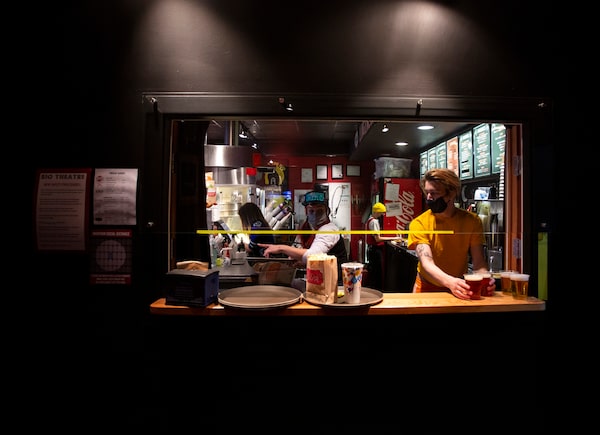Good morning,
With Parliament coming back today after the holiday break, the Liberal government is expected to face questions about its handling of the crisis and the pace at which the country is receiving vaccines.
Specifically, they’ll also be asked about the recession caused by the virus and when Ottawa intends to put forward a detailed account of federal spending in a budget. Conservative Leader Erin O’Toole has said the government is letting down Canadians on the vaccine file and that the country cannot secure its economic future without access to the shots.
- Read the Q&A: John Ibbitson spoke with O’Toole about the COVID-19 pandemic, the economy and Mr. O’Toole’s emerging commitment to continentalism over globalization.

Leader of the Opposition Erin O'Toole rises during Question Period in the House of Commons, in Ottawa, Tuesday, Dec. 8, 2020.Adrian Wyld/The Canadian Press
This is the daily Morning Update newsletter. If you’re reading this on the web, or it was forwarded to you from someone else, you can sign up for Morning Update and more than 20 more Globe newsletters on our newsletter signup page.
More from Power Gap: Corporate Canada
The dearth of women in Canada’s C-suites has been a concern for decades, and yet few companies are willing to do anything about it – even when evidence shows female leadership is good for the bottom line. Now, the pandemic is threatening to undo even meagre progress
Data analysis of top executives at Canada’s largest publicly traded corporations, compiled by The Globe and Mail, shows that just 4 per cent of companies on the benchmark TSX index have a female chief executive officer. That equates to nine women in the role out of 223 companies, as of November.
- Rita Trichur: Bay Street supports board diversity in theory, but not in practice. Time to end the hypocrisy
- Graphic: These are the faces of the TSX

Illustration by Christy Lundy
Canadian alleged drug kingpin arrested at Amsterdam airport
Police arrested Tse Chi Lop, 57, after a years-long investigation by the Australian Federal Police into international networks of drug manufacture and trafficking.
Called one of the biggest drug kingpins in history, Tse was arrested on his way to Canada, placing into custody a shadowy figure with roots in Toronto who, experts believe, stood astride a vast empire of factory-made narcotics.
Catch up on COVID news
In Ontario: The British variant of COVID-19 that’s behind a devastating outbreak at a long-term care home in Barrie, is also being investigated as the possible source of infections at a second facility in the region.
In Alberta: Despite the province footing the bill, COVID-19 isolation hotels sit largely unused. The program’s scant use is a reflection not of the specific policy but of how Alberta lost control of the virus, according to experts.
- Explainer: When can Canadians expect to get a COVID-19 vaccine?
- Editorial: Why is the virus still pouring into Canada on international flights?
- Robyn Urback: This far into the pandemic, shouldn’t lockdowns be more nuanced?

Rio Theatre staff work to fill orders at the concession stand on the theatre's first day open as a sports bar in Vancouver, Saturday, Jan. 23, 2021.Marissa Tiel/The Canadian Press
Got a news tip that you’d like us to look into? E-mail us at tips@globeandmail.com Need to share documents securely? Reach out via SecureDrop
ALSO ON OUR RADAR
University donations of more than $10-million are on the rise: Over the past decade, university fundraising has taken on added urgency as Ontario’s government funding has stagnated.
Even behind bars, Navalny is Putin’s greatest challenge: Calls for Alexey Navalny’s freedom will almost certainly go unanswered. But the protests in Moscow, St. Petersburg and dozens of smaller cities, reveal the scale of his continuing challenge to the Russian President.
Telus subsidiary prepares for initial public offering: Telecom parent Telus Corp. kept its subsidiary’s financial results a closely guarded secret for the past decade as it built the business through acquisitions. Also: Telus’s IT gamble proves to be winning play for CEO Darren Entwistle.
Alberta faces backlash after move to scrap coal policy: A 44-year-old coal and land protection policy has led to a court challenge and a public backlash so strong that the government has cancelled recently issued land leases for coal mining.
MORNING MARKETS
Global stocks advance: Global shares rose to just shy of records highs on Monday, as optimism over a US$1.9-trillion U.S. stimulus plan outweighed rising COVID-19 cases and delays in vaccine supplies. Just before 6 a.m. ET, Britain’s FTSE 100 slipped 0.30 per cent. Germany’s DAX and France’s CAC 40 were off 0.22 per cent and 0.44 per cent, respectively. In Asia, Japan’s Nikkei gained 0.67 per cent. Hong Kong’s Hang Seng jumped 2.41 per cent. New York futures were mostly positive. The Canadian dollar was trading at 78.70 US cents.
Looking for investing ideas? Check out The Globe’s weekly digest of the latest insights and analysis from the pros, stock tips, portfolio strategies and what investors need to know for the week ahead. This week’s edition includes RBC market forecast, industrial REITs’ upside and renewable energy stocks on a tear.
WHAT EVERYONE’S TALKING ABOUT
For Senator Murray Sinclair, leadership is defined by humility
Karl Moore and Wáhiakatste Diome-Deer: As a politician, jurist and community activist, he has dedicated his life to highlighting the power of conversation as a means of educating Canadians about a more complete version of their country’s history.
Where is intellectual courage in the age of Twitter?
Tom Rachman: “The elusiveness of intellectual courage derives from this: “the culture” does not exist any more. It’s subcultures all the way down, most evidently on Twitter, each clan affirming its own rectitude – while hurling Molotov cocktails over the wall at its chosen sinners.”
TODAY’S EDITORIAL CARTOON

Dave Parkins/The Globe and Mail
LIVING BETTER

A woman doing embroidery at home. It's a very soothing pastime but also a very creative one.Hiraman/iStockPhoto / Getty Images
How do you develop a new hobby that you actually want to maintain?
Other people must be able to relate, because all year, we’ve watched them turn, en masse, to hobbies. The problem is figuring out where to start without filling your apartment with costly crafting supplies just to discover what you’re not interested in.
Emily Arbour, the owner of Ottawa-based crafted goods store Cheerfully Made, says to get inspired by what you see online, then think of role it will play in your life: is it for yourself or to share with others?
- Try a new hobby to fill your winter nights with our series of free livestreamed classes. Check out tgam.ca/craftclub, where you’ll also find a list of supplies needed each week. If you try any of our Craft Club projects, show us on social with #globeCraftClub, and join our Facebook group.
MOMENT IN TIME:
Toronto Maple Leafs hockey player John Kordic hams it up as he gets flu shot from Dr. Ted Broadway, to the admusement of teammate Wendel Clark, sitting in rear, October 20, 1989.EDWARD REGAN/The Globe and Mail
Flu shots for the Leafs
For more than 100 years, photographers have preserved an extraordinary collection of 20th-century news photography for The Globe and Mail. Every Monday, The Globe features one of these images. This month, we’re looking at vaccines.
The photo above shows Toronto Maple Leafs hockey player John Kordic hamming it up for Globe and Mail photographer Edward Regan at the team’s flu-shot clinic in 1989, while teammate Wendel Clark stoically awaits his jab from Dr. Ted Broadway. Time would tell how effective that year’s shot would be, since the vaccine changes each flu season based on the most common strains circulating around the world, but history tells us 1989 was not an exceptional year for the flu. The epidemic of 1918-19, also known as the Spanish flu, was a different story, killing about 50,000 Canadians and 50 million worldwide. Then, as now, municipal governments closed all but the essential services, and provinces required quarantine and the wearing of masks in public. In those days, however, there were no paid sick days or employment insurance. Medicare owes a debt to the labour unrest of 1919. Dianne Nice
If you’d like to receive this newsletter by e-mail every weekday morning, go here to sign up. If you have any feedback, send us a note.